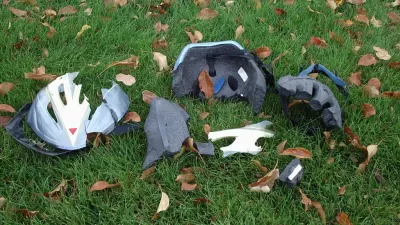District of Columbia
Controversial Eisenhower Memorial Gets Another Update and Crucial Commission Approval
The long-running saga surrounding Frank Gehry's design for a memorial to Dwight D. Eisenhower may actually be heading towards a resolution with last week's vote of approval from the Eisenhower Memorial Commission.
With Improvements, Baltimore Seeks to Steal D.C.'s Thunder...and Residents
The last decade has brought tremendous growth and prosperity to Washington D.C., but it's neighbor to the north hasn't been so blessed. Planned infrastructure improvements are intended to lure new residents to Baltimore's cheaper cost of living.
Attack Raises Questions About Safety of Popular D.C. Bike Route
An unprovoked attack on a bicycle commuter by as many as 15 youths in Washington D.C. this week is raising questions about the safety of one of the city's most popular bike routes.
D.C. Bike Share Steers Economic Growth
Real estate listings tout proximity to it, retailers want to be near it, and communities are clamoring for it; Capital Bikeshare has become an economic development tool that some think could be as potent as cars and Metro in guiding development.
What is the Role of the National Mall?
The cancellation of the Hirshhorn Museum's bubble project has Dan Malouff pondering the role of the National Mall. Should it be an urban room whose buildings define its open space, or the setting for risk-taking architecture?

Bike Helmet Safety Not What We Thought It To Be
According to Jim Titus, two federal government agencies will withdraw their claims that bike helmets are "85% effective".
Sharing Transit Costs Produces Shared Benefits in D.C.'s NoMa Neighborhood
Jay Corbalis profiles NoMa (short for “North of Massachusetts Avenue”), Washington D.C.'s fastest growing neighborhood, where a building boom has been propelled by an innovative transit funding partnership between the public and private sectors.
Trend Watch: Swapping Gasoline Excise Taxes for Wholesale Sales Taxes
The D.C. Council is going the way of neighbors Virginia and Maryland by approving new wholesale sales taxes on gasoline and diesel. In it's budget approved on May 22, the council swapped the current 23.5-cent excise tax for a new 8.3% fuel tax.
To Pop or Not? Hirshhorn 'Bubble' Puts Museum at a Crossroads
Designed by Diller Scofidio & Renfro, the Hirshhorn "Bubble" would cost $12.5 million and operate two months out of the year, creating performance and additional gallery space for the museum on the National Mall. If it actually gets built, that is.
The Ups and Downs of the Bike Sharing Economy
What makes Capital Bikeshare, the largest such program in the U.S. with nearly 2000 bikes, a success? What are its shortcomings? Mohana Ravindranath investigates.
Discussion on Increasing D.C. Height Limits Becomes One-Sided Debate
A public presentation by the D.C. Office of Planning on the potential for amending the city's controversial height limits revealed residents' many concerns, and little support, for the Congressionally mandated review.
D.C. Suburbs Squeezed by Federal Budget Cuts
After a decade of phenomenal growth driven by security and stimulus spending, recent cuts to the federal government's budget are being felt throughout D.C. As office vacancies fall nationwide, they're rising in the Washington area.
In Battle for Disposable Income, Dining Out Devours the Competition
For Americans under 34, the amount of money spent dining out has increased by more than 20% over the last decade; as the recording industry has been in a tailspin. In the battle to earn urbanites' dollars, food purveyors are the new rock stars.
In D.C., Nearby Projects Reveal Advantages of Effective Outreach
The divergent routes to approvals for two apartment complex developments just a mile apart show how important it is to engage both government and the surrounding community early in the process.
Gas Stations Get Guzzled as D.C.'s Suburbs Densify
Reflecting a nationwide trend, gas stations across the Washington D.C. metro area are disappearing, as rising land values and shrinking margins have station owners eager to sell.
To Discern D.C.'s Haves and Have-Nots, Look to the Trees
In Washington D.C., double the amount of residents in affluent areas live among plentiful green spaces. Lessening the disparity will require the cooperation of private property owners, not all of whom see more trees as a good thing.
Competition Yields Radically Different Visions for Prime D.C. Site
The General Services Administration, which is looking for ways to fund a new FBI campus, has more ideas at its fingertips with three tantalizing proposals for redeveloping the Hoover Building in downtown Washington, D.C., writes Jonathan O'Connell.
Maryland Suburb Fights Sidewalks
The DC metropolitan area has a largely suburban character inherited from an era when cars were the only conceivable form of transportation. Efforts to expand sidewalk infrastructure are meeting resistance, especially in University Hill.
Hoping to Land Public Housing in D.C.? Be Ready to Wait 39 Years
On Friday, the D.C. Housing Authority mercifully closed its insultingly long public housing waiting list. With the average rent at $1,759/month for a one-bedroom apartment, the need for affordable housing in the city is tremendous.
D.C. Subway Makeover Plans Court Controversy
For the first time since the system was opened in 1976, Washington D.C.'s iconic subway stations are getting a substantial redesign. Preservationists and historians are questioning the appropriateness of the changes.
Pagination
Urban Design for Planners 1: Software Tools
This six-course series explores essential urban design concepts using open source software and equips planners with the tools they need to participate fully in the urban design process.
Planning for Universal Design
Learn the tools for implementing Universal Design in planning regulations.
Heyer Gruel & Associates PA
JM Goldson LLC
Custer County Colorado
City of Camden Redevelopment Agency
City of Astoria
Transportation Research & Education Center (TREC) at Portland State University
Jefferson Parish Government
Camden Redevelopment Agency
City of Claremont


































